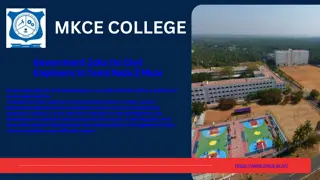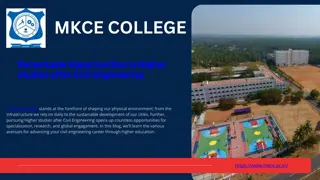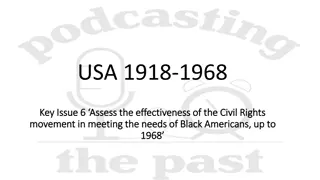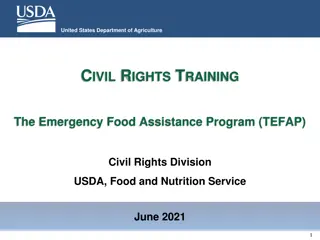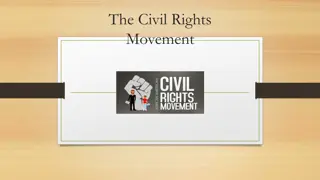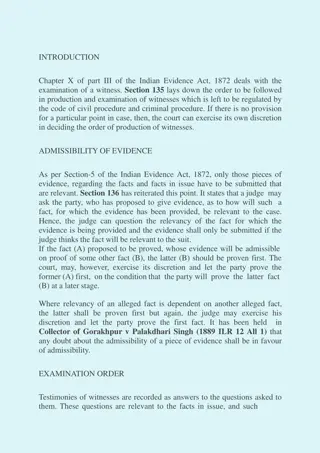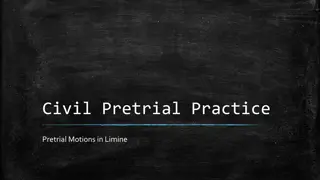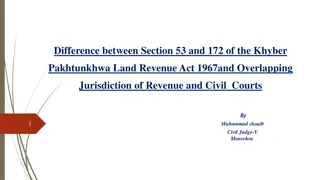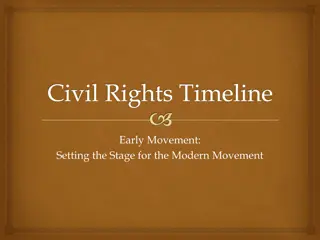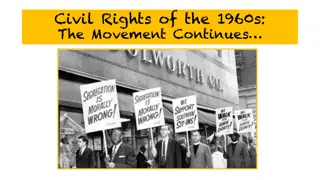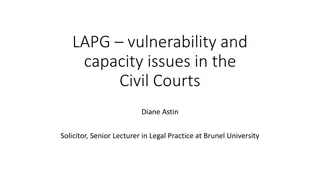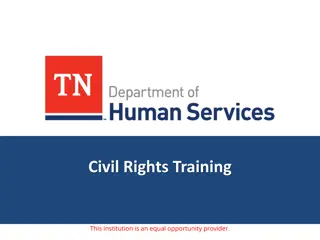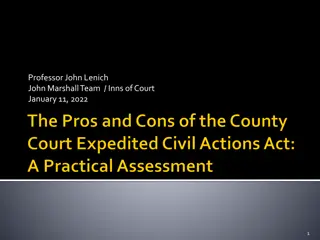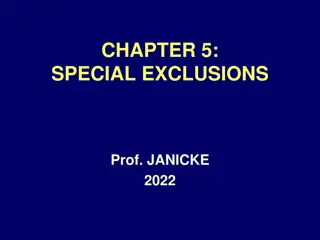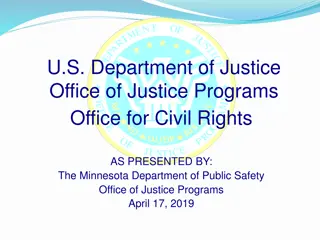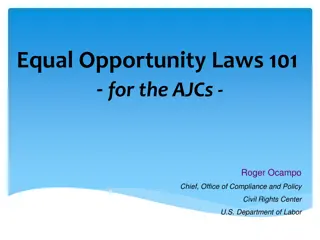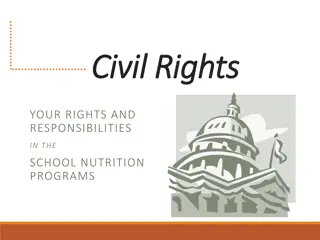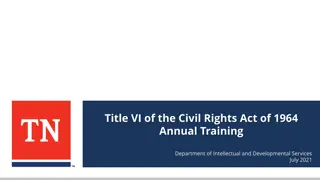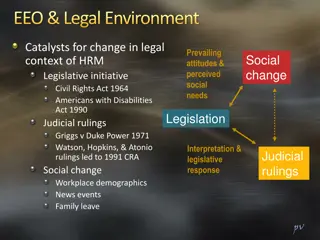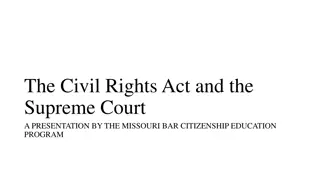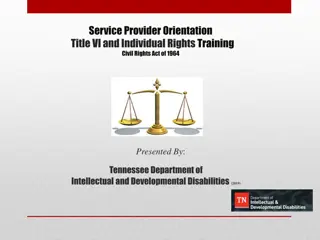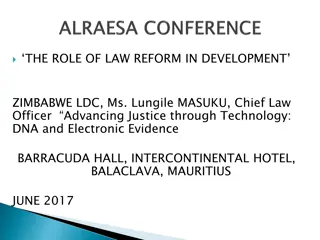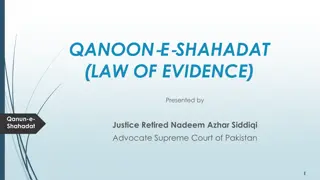❤[PDF]⚡ Civil War Talks: Further Reminiscences of George S. Bernard and His Fel
\"COPY LINK HERE ; https:\/\/getpdf.readbooks.link\/0813931754\n\nRead ebook [PDF] Civil War Talks: Further Reminiscences of George S. Bernard and His Fellow Veterans (A Nation Divided: Studies in the Civil War Era) | Civil War Talks: Further Reminiscences of George S. Bernard and His Fellow Vetera
1 views • 6 slides
The Role of Artifacts and Evidence in Educator Evaluation and Support
Exploring the role of artifacts and evidence in educator evaluation, this content covers the three categories of evidence required by the Oregon Framework. It delves into the efficient process that reduces redundancy, essential components of SLG goals, and the types of evidence relevant to professio
0 views • 15 slides
Understanding Impression Evidence Collection in CSI Investigations
Impression evidence plays a crucial role in investigations, including shoeprints, tool marks, tire tracks, bite marks, and riffling marks on bullets. This evidence can be collected in 2D using photography or tape lifts, and in 3D through casting methods. Differentiating between class and individual
0 views • 21 slides
Illegally obtained evidence
Illegally obtained evidence refers to evidence acquired through unlawful means, such as searches without warrants or extraction under duress. The Fruit of the Poisonous Tree doctrine renders evidence inadmissible if derived from illegally obtained evidence. The Exclusionary Rule prohibits the use of
2 views • 30 slides
Government Jobs for Civil Engineers In Tamil Nadu Mkce
Government Jobs for Civil Engineering:\nGovernment Jobs for Civil engineering is a versatile field that offers a plethora of career opportunities,\nincluding lucrative options in the government sector. In India, various government departments and agencies actively recruit civil engineering graduates
0 views • 2 slides
Remarkable Opportunities in Higher studies after Civil Engineering
Higher studies after Civil Engineering in Tamil Nadu\nCivil engineering stands at the forefront of shaping our physical environment; from the infrastructure we rely on daily to the sustainable development of our cities. Further, pursuing Higher studies after Civil Engineering opens up countless oppo
0 views • 2 slides
Understanding Civil Society: Concepts, Challenges, and Implications
Explore the dynamics of civil society, from its dense network of groups to its role in democracy. Delve into the typology of Civil Society Organizations, the connection between civil society and democracy, and the unique landscape of civil society in Norway. Engage in thought-provoking discussions o
0 views • 9 slides
Fair Housing and Civil Rights Requirements for RAD Public Housing Conversions
Overview of the fair housing and civil rights laws governing RAD public housing conversions, including the purpose and authority of HUD's Front-End Civil Rights Reviews. The process involves upfront reviews of elements with civil rights implications to ensure compliance with laws such as the Fair Ho
0 views • 22 slides
The Effectiveness of the Civil Rights Movement in Meeting the Needs of Black Americans up to 1968
Assessing the impact of the Civil Rights movement on Black Americans up to 1968 reveals significant progress in ending racial discrimination and segregation, securing voting rights, and advocating for social and economic equality. Despite achievements like the Civil Rights Act of 1964 and the Voting
0 views • 36 slides
USDA Civil Rights Training for TEFAP Program
The USDA Civil Rights Training emphasizes the importance of training for state agencies, subrecipient agencies, frontline staff, and volunteers involved in the Emergency Food Assistance Program (TEFAP). It covers various aspects of Civil Rights compliance, including public notification, complaint pr
0 views • 48 slides
The Civil Rights Movement: Struggles and Triumphs
Abolitionists fought against slavery, leading to the Emancipation Proclamation during the Civil War. Early protests against Jim Crow laws laid the foundation for organizations like the NAACP. Key events, such as Rosa Parks' arrest and the Civil Rights Act of 1964, marked significant progress. The Vo
0 views • 7 slides
Evolution of Leadership and Management in the Civil Service: A Historical Perspective
The evolution of leadership and management within the Civil Service is traced from the establishment of the Civil Service College in 1970 to the recent initiatives like the Government Skills and Curriculum Unit established in 2020. The journey includes significant milestones such as the introduction
1 views • 20 slides
Examination of Witnesses under Indian Evidence Act, 1872
Chapter X of Part III of the Indian Evidence Act, 1872, outlines the process of examining witnesses, including the order of production and admissibility of evidence. Sections 135 to 141 delve into the rules governing the examination-in-chief, cross-examination, and re-examination of witnesses, empha
2 views • 8 slides
Understanding Pretrial Motions in Limine in Civil Pretrial Practice
Pretrial motions in limine (MIL) play a crucial role in civil pretrial practice by seeking evidentiary rulings in advance to control the introduction of evidence at trial. These motions aim to prevent the admission of irrelevant, inadmissible, or prejudicial evidence and can also facilitate the intr
1 views • 17 slides
Understanding Key Sections of Khyber Pakhtunkhwa Land Revenue Act 1967 and Civil Court Jurisdiction
Explore the differences between Section 53 and 172 of the Khyber Pakhtunkhwa Land Revenue Act 1967, the overlapping jurisdiction of revenue and civil courts, and the concept of Trias Politica. Learn about Civil Court jurisdiction, including the exceptions and the scope of judicial review over action
1 views • 12 slides
Civil Rights Training Overview for SMP Participants
This civil rights training presentation covers the goals of civil rights, discrimination, protected classes, examples of discrimination, components of civil rights compliance, and the importance of equal access for all participants in the SMP program. It emphasizes equal treatment, knowledge of righ
0 views • 36 slides
Early Civil Rights Movement: Abolition, Legislation, and Freedom
Abolitionist groups form to fight against slavery in 1775, leading to the establishment of the Pennsylvania Society for Promoting the Abolition of Slavery. Legislation such as the Slave Trade Act of 1794 and the outlawing of slavery by different states played a crucial role in the early civil rights
0 views • 58 slides
Challenges and Progress in 1920s American Civil Rights Movement
The 1920s in America saw significant changes in civil rights, women's movement, and prohibition. Civil rights encompass personal freedoms guaranteed by the U.S. Constitution, including freedom of speech, voting rights, and protection from discrimination. Violations of civil rights have occurred thro
1 views • 42 slides
Civil Rights Movement of the 1960s: A Historic Journey
The Civil Rights Movement of the 1960s was a pivotal time in American history marked by significant events such as the Freedom Riders, University of Mississippi integration, Birmingham Campaign, March on Washington, Freedom Summer, Civil Rights Act of 1964, Selma to Montgomery March, and the emergen
0 views • 12 slides
Understanding Vulnerability and Capacity Issues in Civil Courts
Exploring vulnerability and capacity issues in civil courts, this content delves into the importance of addressing vulnerabilities of parties and witnesses for ensuring fair participation and quality evidence in legal proceedings. Topics covered include factors contributing to vulnerability, the rol
0 views • 21 slides
Civil Rights Training: Importance and Legal Framework
Civil rights training is essential for organizations receiving federal funds to prevent discrimination and ensure compliance with laws. This training covers legal authorities, compliance areas, and the importance of eliminating discrimination in programs. Understanding Title VI of the Civil Rights A
0 views • 47 slides
Understanding Biased Assimilation and Attitude Polarization in Social Disputes
People with strong opinions on complex social issues tend to interpret evidence in a biased manner, accepting confirming evidence readily while subjecting disconfirming evidence to critical evaluation. This can lead to increased polarization rather than narrowing of disagreement when exposed to the
0 views • 20 slides
Overview of Civil Service System in India
The Civil Service system in India has a rich history dating back to 1854 when the concept of a Permanent Civil Service based on merit through competitive examinations was introduced. It encompasses features such as open-entry based on competitive exams, elaborate training, tenured positions at vario
0 views • 21 slides
Enhancing Civil Society Engagement in the Global Financing Facility (GFF)
Explore key tools and strategies for enhancing civil society engagement in the GFF, including the Civil Society Engagement Strategy, guidance notes, CSO resources, and the value of civil society in RMNCAH+N. Learn how civil society can contribute to advocacy, monitoring, accountability, and more tow
0 views • 16 slides
Asset Recovery Practices in England and Wales: Criminal vs. Civil Proceedings
Asset recovery in England and Wales involves a combination of criminal and civil proceedings to secure justice and return funds to victims of crime. The CPS's Proceeds of Crime Division plays a crucial role in obtaining Restraint Orders and Confiscation Orders. Civil recovery, focusing on illicit fi
0 views • 11 slides
Understanding Civil and Criminal Law Processes
Explore the differences between civil and criminal law, covering civil trial steps, Miranda Rights, pleadings, and more. Discover the nuances of civil trials, starting with a complaint, and criminal trials, which begin with an arrest. Learn about the Miranda Rights and the essential stages of a civi
0 views • 37 slides
Understanding the County Court Expedited Civil Actions Act
The County Court Expedited Civil Actions Act aims to establish a streamlined process for civil actions in county court involving claims for modest money judgments. It imposes limitations on formal discovery, allows the use of written reports from healthcare providers, and sets trial time constraints
0 views • 33 slides
Understanding Special Exclusions in Character Evidence Law
Explore the nuances of character evidence in legal contexts through Professor Janicke's insights on special exclusions, including the limitations and exceptions in civil and criminal cases, the reasons character evidence is often disallowed, and the application of Rule 404(b) for specific circumstan
0 views • 48 slides
Civil War and Reconstruction: Historical Study Materials
In this historical study material, you will find details about the Civil War battles, speeches, and the process of Reconstruction after the Civil War. The content covers key figures like President Lincoln and Andrew Johnson, the Freedmen's Bureau, Black Codes, and the quest for civil rights for free
0 views • 16 slides
Practice and Procedure in Judicial Review: Factual Evidence and Interveners
The content provides valuable insights into the practice and procedure regarding factual evidence and interveners in judicial review cases. It covers general rules, recent cases, applications for oral evidence, questioning witnesses, opinion evidence, and the role of interveners. Key points include
0 views • 28 slides
Civil Rights Obligations in Federal Funding Programs
Federal funding programs require adherence to civil rights obligations, as enforced by the Office for Civil Rights. This includes upholding non-discrimination laws such as Title VI of the Civil Rights Act of 1964, the Omnibus Crime Control and Safe Streets Act of 1968, Section 504 of the Rehabilitat
0 views • 63 slides
Understanding Equal Opportunity Laws and Civil Rights Acts
This content covers the importance of enforcing equal opportunity laws and civil rights acts to promote justice and equality in various aspects of society, such as employment, programs receiving financial assistance, public accommodations, and education. It delves into the mission of the Civil Right
0 views • 46 slides
Understanding Civil Rights in School Nutrition Programs
This content provides information on civil rights in school nutrition programs, including the rights and responsibilities of staff and participants, annual training requirements, goals to eliminate barriers, definitions of civil rights terms, how to identify discriminatory actions, protected classes
0 views • 24 slides
Understanding Title VI of the Civil Rights Act of 1964
Title VI of the Civil Rights Act of 1964 prohibits discrimination based on race, color, and national origin in programs receiving federal financial assistance. This training provides an overview of the Act, identification of protected classes, compliance obligations, reporting procedures, and histor
0 views • 22 slides
Evolution of Civil Rights Protections in the Workplace
Explore the journey of civil rights protections in the workplace, spanning from the enactment of the Civil Rights Act of 1964 to the Equal Pay Act of 1963 and beyond. Discover key legislative initiatives, judicial rulings, social changes, and prevailing attitudes that have shaped the legal environme
0 views • 14 slides
The Civil Rights Act of 1964 and the Supreme Court
In the 1960s, Congress passed the Civil Rights Act of 1964, a pivotal legislation that prohibited discrimination in public accommodations. This act represented a significant shift in focus towards minority rights. The Supreme Court's past rulings on the Civil Rights Act of 1875 influenced Congress t
0 views • 24 slides
Understanding Human and Civil Rights in DIDD Services
Protecting the rights of individuals receiving Department of Intellectual and Developmental Disabilities (DIDD) services is essential. This training covers Title VI and individual rights under the Civil Rights Act of 1964, emphasizing equality and access to programs regardless of race, color, sex, d
1 views • 31 slides
The Role of Law Reform in Development: Advancing Justice Through Technology
The legal field in Zimbabwe is undergoing significant law reform to align with technological advancements, focusing on DNA and electronic evidence. The Law Development Commission plays a crucial role in promoting the development and reform of laws to keep pace with changing times and situations, emp
0 views • 28 slides
Understanding Qanun-e-Shahadat: Law of Evidence in Pakistan
Qanun-e-Shahadat Order 1984 replaced the Evidence Act of 1872 in Pakistan, aiming to align the law of evidence with Islamic principles. This law is crucial for judicial proceedings, governing the admissibility of oral and documentary evidence, primary and secondary evidence, and resolving conflicts
0 views • 22 slides
Civil Rights Post-Test Questions
This post-test consists of 10 questions related to civil rights, specifically focusing on protected classes, discrimination, and civil rights complaint procedures. Answer the questions and receive immediate feedback on your responses. The test covers topics such as School Nutrition Programs, Federal
0 views • 32 slides
![❤[PDF]⚡ Civil War Talks: Further Reminiscences of George S. Bernard and His Fel](/thumb/20551/pdf-civil-war-talks-further-reminiscences-of-george-s-bernard-and-his-fel.jpg)



